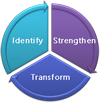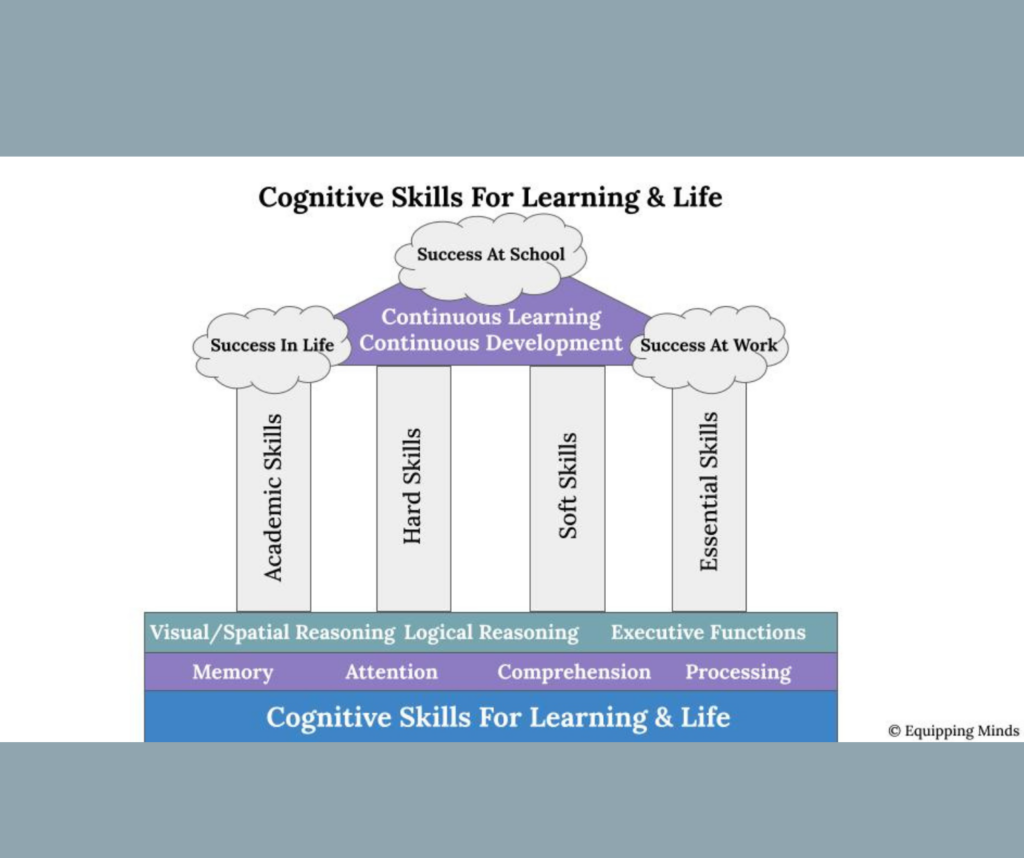Academic skills, hard skills, soft skills, and essential skills will always be underdeveloped unless the cognitive skills are strong. Cognitive skills equip students/employees to learn complex tasks, to perform mental math problems, to ignore distractions, to follow multiple step directions, to remember what they read, and to plan and think strategically. Equipping Minds is a cognitive training program that gives the cognitive tools for learning: cognitive flexibility, self-regulation, attention, working memory, processing, comprehension, reasoning, attention, and executive functioning skills. Educators and employers can learn how to strengthen these skills that generalize to academics, the workplace, verbal and nonverbal abilities, and IQ. Cognitive skills can be taught, learned, and developed. Hence, they are the prerequisites of thinking and learning.
This model can be used by trained teachers, employers, parents, and individuals to better understand and help the child/adult who is experiencing learning difficulties. The emphasis is on strengthening cognitive abilities to make learning successful.
I have trained schools, learning centers, medical centers… in over 40 countries since 2010. The results are published in peer reviewed journals and college textbooks.
This has also been incredibly successful with children and adults with disabilities and learning challenges
Cognitive training strengthens a student’s cognitive skills. Cognitive training produces lasting results in a short time and can greatly diminish or eliminate the need for tutoring in the future.
The following is a list of the underlying cognitive functions needed to learn:
Efficient Cognitive Functions – Feuerstein Institute Definitions by J. Zehr
Input Level
1. Focus and Perceive (The more data that goes in via our senses, the more info we use.)
2. Systematically search (Systematically approach new objects or information.)
3. Use labels (Without a name for something, we can’t think about it.)
4. Know where you are in space (Right, left, front, and back are critical concepts.)
5. Be aware of time (How much, how old, how often, sequence of events.)
6. Conserve constancies (Decide what characteristics stay the same even when changes
happen. What attributes must remain the same for an object to retain its identity?)
7. Collectpreciseandaccuratedata(Therightinformationtogettherightanswer.)
8. Use more than one source of information (Keeping two ideas in the mind at the same
time assists in comparing and higher order thinking.)
Elaboration Level
1. Definetheproblem(WhatamItodo?Problem,whatproblem?)
2. Search for relevant cues (What is relevant to the problem?)
3. Spontaneous need to compare (Seeking similarities and differences.)
4. Recall and use several pieces of information (Using info for long term-memory.)
5. Understandreality(Understandcauseandeffectrelationships.)
6. Use logical evidence (Does this make sense?)
7. Abstractthinking(Movingawayfromtheconcrete;visualizing.)
8. Use hypothetical thinking / “iffy” thinking (If this is true, then what else must be true?)
9. Test the hypothesis (How can I see if this is true?)
10.Develop problem-solving strategies (Creating frameworks for solutions.) 11.Make a plan; think forward (State the steps and reasons.)
12.Form categories (Understanding relationships to categorize objects; applying
conceptual labels: red, blue, green = colors.)
13.Summing up: see the BIG picture (What is the main idea? How many things are there?)
Output Level
1. Consider another person’s point of view (The mind version of experiencing orientation in space physically — “Gee, it’s different when I am in your position!”)
2. Project virtual relationships (I can see things that aren’t there: four dots can be a square; two women can be cousins.)
3. Stick to it – perseverance! (Don’t ever, ever, ever give up! Overcome blocking.)
4. Just a moment… Let me think! (Avoiding trial-and-error responses.)
5. Giveathoughtresponse(CanIcommunicateclearlywithjusttherightvocabulary?)
6. Use precision and accuracy (Do it right, take your time, say it or complete it accurately.)
7. Visual transporting (Copy accurately from the board or source.)
8. Show self-control (I think before I speak or act; controlling impulsivity.)
Areas where our cognitive training instruction has specifically been applied:
Reading
Spelling
Critical Thinking
Attention
Memory
Listening Comprehension and Reading Comprehension
Writing Skills
Study Skills
Math Reasoning – Math Computation – Math Word Problems – Math Facts
Test Taking Skills
Problem Solving
Academic skills and the Common Core are the subjects we learn in school: math, literature, science, history, languages, etc. Students with weak cognitive skills may have many difficulties in academic learning. Tutoring is focused on providing encouragement, support, and instruction in academic subjects: math, writing, science. It is usually necessary for most of a student’s academic career.
Reading
For example, reading involves sound to symbol connections. One must be able to tell if sounds are the same or different, the order and number of sounds, hold all of those in place, and then read and spell. When one of these skills is weak, students may struggle with reading and spelling. The cognitive skills involved here include the following: visual processing, auditory processing, working memory, long term memory, and comprehension.
Students struggling to read would begin cognitive skill training with an emphasis on strengthening auditory processing skills. The students also strengthen their skills of attention, visual processing, short-term and long-term memory, and logic and reasoning. The therapy includes brain training exercises which are challenging and fun.
Classroom Connection with Equipping Minds Once the underlying cognitive skills are strengthened, the academic skills become easier. Though we do not train specifically in math, English or other academic subjects, the students are taught to make the connection to those subjects through vocabulary development, visualization of letters for spelling and reading, oral and written expression, reading comprehension, attention skills, study and outlining skills, and visualization of numbers for math facts and math sense. All of these skills are required throughout life. By improving and automating these skills, the key to learning fast and efficiently is discovered. The Equipping Minds specialist can provide support in writing and curriculum selection if needed.
Read personal testimonials from past clients and parents.
More on what we do.

